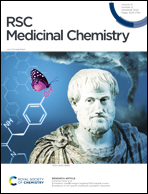A silicon-containing aryl/penta-1,4-dien-3-one/amine hybrid exhibits antiproliferative effects on breast cancer cells by targeting the HSP90 C-terminus without inducing heat-shock response†
Abstract
A pharmacophore-hybridized strategy based on previously reported HSP90 C-terminal inhibitors was utilized to prepare 32 aryl/penta-1,4-dien-3-one/amine hybrids. Among them, a silicon-containing compound 1z exhibited remarkable broad-spectrum antiproliferative effects on various human breast cancer cell lines. Through fluorescence polarization and AlphaScreen-based assays, we demonstrated that 1z specifically inhibited the HSP90 C-terminus without affecting HSP90 N-terminus. Furthermore, 1z effectively inhibited the HSP90 C-terminus without inducing heat-shock response (HSR), leading to the degradation of its client proteins HER2, pAKT, AKT, and CDK4, causing G1 arrest of MCF-7 and SKBr3 cells, and ultimately contributing to apoptosis of these cells through caspase-3, caspase-8, and caspase-9 activation. Additionally, the penta-1,4-dien-3-one linker in the hybrid, a large bulky lipophilic substitution in the aryl fragment at the 3′-site, and the presence of N-methylpiperazine as the amine fragment were identified as crucial factors that significantly contributed to the observed antiproliferative activity through structure–activity relationship (SAR) analysis. Lastly, we found that 1z exhibited superior thermostability compared to vibsanin B derivatives and good in vitro metabolic stability in simulated intestinal fluid, representing one of the few reported silicon-containing HSP90 C-terminal inhibitors.



 Please wait while we load your content...
Please wait while we load your content...